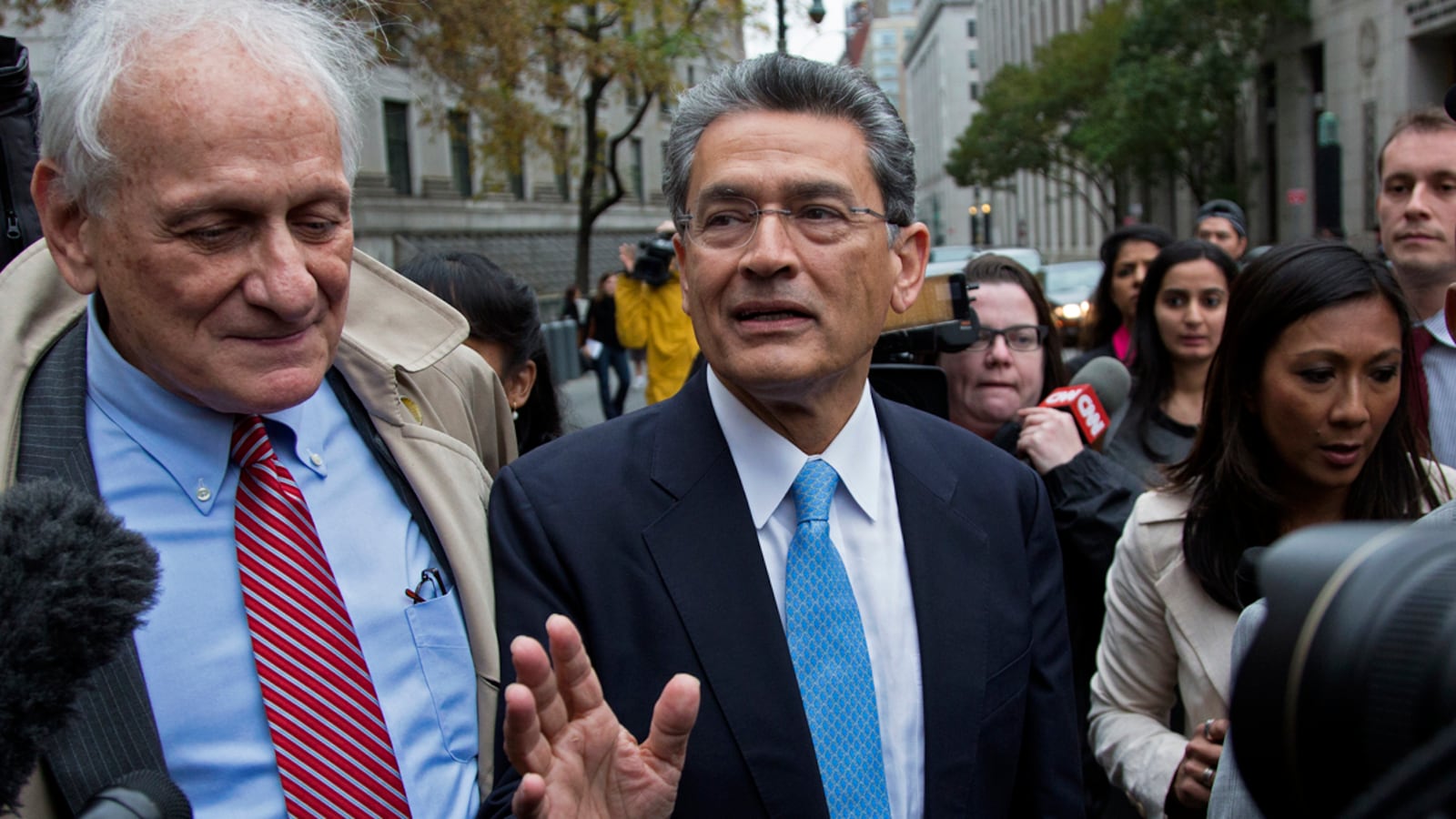U.S. District Judge Jed Rakoff wiped the sad frown right off the face of convicted insider trader Rajat Gupta Wednesday by sentencing him to two years in prison, rather than the eight to 10 years requested by prosecutors.
Rakoff, who also imposed a $5 million fine for what he called “the aberrant nature of Mr. Gupta’s conduct,” said: “Insider trading is an easy crime to commit, but a hard crime to catch.”
Even so, Gupta knew his luck was with him and his multimillion-dollar legal team, gently hugging his lead defense lawyer Gary Naftalis and softly whispering “Thanks” as he was stuffed into a black limo to escape the press scrum.
In the 14th floor courtroom, Gupta had managed to suppress a smile until he was talking to his appeals lawyer, former solicitor general Seth Waxman, with his back turned to the courtroom crowd. As the 90-minute hearing began, Gupta’s wife, Anita, had donned sunglasses to hide possible tears while the eldest of their four daughters repeatedly dabbed at her eyes. When the sentence on four counts was handed down, it was dry eyes all around, thanks to the instant realization that in addition to a light sentence, the judge was going to allow the family breadwinner and saint to spend the holiday season a free man before reporting to a minimum security prison Jan. 8.
Gupta, the 63-year-old former global head of McKinsey & Co., had been one of the world’s most highly regarded insiders, a confidant roaming the top echelons of multinational corporations and governments, until he got caught feeding confidential, nonpublic, material financial information gleaned as a trusted board member of Goldman Sachs in 2008.
The management guru had tipped off hedge fund operator Raj Rajaratnam, who was sentenced to 11 years in prison a year ago and awaits a hearing Thursday appealing his conviction. After learning at a Sept. 23, 2008 board meeting that Warren Buffett was going to invest $5 billion in Goldman Sachs, Gupta immediately telephoned Rajaratnam, who in less than five minutes before the New York Stock Exchange closed managed to buy $43 million worth of Goldman shares and generate a $1.2 million profit the next morning. An October call about Goldman’s possible first-time-ever losses saved Rajaratnam another $3.8 million when he dumped his stock immediately.

Of the 23 people charged in the Rajaratnam investigation and 70 found guilty of insider trading, Gupta was by far the most important since he was charged with leaking boardroom secrets over a two year period while a director of Goldman Sachs and Procter & Gamble. But by the luck of the draw, Gupta is the latest beneficiary of Rakoff’s ongoing judicial assault on what he perceives to be the irrationality of federal sentencing guidelines.
The judge—already well known as a light touch for securities fraudsters—seemed to talk a big game about the severity of Gupta’s crimes. “The heart of Mr. Gupta’s offense here, it bears repeating, is his egregious breech of trust.” The judge also labeled Gupta’s crimes “disgusting.” He said: “In the court’s view, the evidence at trial, established to a virtual certainty, that Mr. Gupta, well knowing his fiduciary responsibilities to Goldman Sachs, brazenly disclosed material, nonpublic information to Mr. Rajaratnam at the very time, September and October 2008, when our financial institutions were in immense distress and most in need of stability, repose and trust…. This was the functional equivalent of stabbing Goldman in the back.”
But when it came to arguing for a heavy sentence, Assistant U.S. Attorney Richard Tarlowe barely got a word in edgewise about the severity of Gupta’s crimes as the judge pressed on.
Rakoff reverted to form, living up to his growing reputation as a judge who is soft on white-collar crime. He condemned securities crime sentencing guidelines pumped up by Congress after public outcries about the WorldCom and Enron scandals. He called them “an ever more draconian approach to white collar crime, unsupported by any empirical data.”
Reading his written opinion justifying his “non-guideline sentence,” Rakoff said: “Human beings in their interactions with society are too complicated to be treated like commodities, and the attempt to do so can only lead to bizarre results. Nowhere is this more obvious than in this very case.”
The problem, Rakoff said, is that the guidelines depend way too heavily on a formula to try to calculate “monetary gain’ from insider trading activities, which, sometimes is not immediately apparent. Gupta invested millions with Rajaratnam, was made chairman of one of his hedge funds and an equity partner of another, yet he got no suitcases full of cash or other immediate tawdry enticements, such as an extramarital affair, that normally pop up as inducements to much lower-level tipsters encouraged by corrupt traders.
Furthermore, Rakoff—departing from any evidence presented in public at Gupta’s four-week-long trial—suggested that somehow Rajaratnam enticed Gupta when Gupta’s judgment may have been impaired after stepping down from his prestigious job running the global consulting firm McKinsey. Before ordering that Gupta, as part of his punishment, report to an alcohol aftercare treatment program, the judge said: “There is also in some of the information presented to the Court under seal an implicit suggestion that after so many years of assuming the role of father to all, Gupta may have longed to escape the straightjacket of overwhelming responsibility, and had begun to loosen his self-restraint in ways that clouded his judgment.”
Armed with 400 letters from friends, including Microsoft cofounder Bill Gates and former United Nations Secretary General Kofi Annan proclaiming Gupta a legendary and selfless humanitarian, the defense had portrayed Gupta as the greatest saint from Kolkata since Mother Teresa departed.
The judge claimed to be impressed, but unswayed, as he noted: “History has shown good men do bad things.” After praising his old friend Naftalis for his ingenuity in proposing that Gupta skip prison in favor of public service with Covenant House in New York or with medical charities trying to reduce AIDS in Rwanda, the judge noted: “the thought that came to mind … was this was a Peace Corps for insider traders.”
Saying “while some have suggested the large volumes of poignant letters submitted on Mr. Gupta’s case are simply the stratagem of a rich, well-connected defendant endeavoring to derail the Court from focusing on his crimes, this is simply not the case,” the judge said no defendant before Gupta had ever displayed “such an extraordinary devotion, not only to humanity writ large, but also to individual human beings in their times of need.”
The judge said he expected Gupta to resume his good works without help from the court. The judge even twice mentioned former Drexel Burnham trader Michael Milken as another securities fraudster who after conviction returned to philanthropic work as a means to try to restore his reputation.
Gupta, reading a statement in a clear even voice, apologized to his friends, family, charities, educational institutions, and his former company McKinsey for the damage he had done to their faith in him and their reputations. Yet, there was not a word of apology to Goldman Sachs, the company which the judge called the “real victim” and which is seeking restitution from Gupta of more than $6 million. Nor did he mention Procter & Gamble, even though the jury acquitted him on the two counts accusing him of leaking confidential information from P&G's board. Right after the trial, statements from Gupta’s legal team continued to assert his innocence and his intention to appeal both his sentence and the order that he report to jail before his appeals are exhausted.
U.S. Attorney Preet Bharara almost seemed relieved that Rakoff did not allow Gupta to escape imprisonment, saying Gupta “must face the grave consequences of his crime—a term of imprisonment…. We hope that others who might consider breaking the securities laws will take heed from this sad occasion and choose not to follow in Mr. Gupta’s footsteps.”
The judge’s final defense of his sentence was this: “While no defendant should be made a martyr to public passion, meaningful punishment is still necessary to reaffirm society’s deep-seated need to see justice triumphant. No sentence of probation, or anything close to it, could serve this purpose.”
So is a two-year prison term for a man at the epicenter of the capitalist system really a deterrent to future insider traders, especially since the judge’s perspective is that reputational damage is enough specific harm to stop privileged white-collar criminals from becoming recidivists? One can only wonder whether Bill Gates, former Wesray Capital Corp. chairman Ray Chambers, and the other celebrated capitalists who wrote letters for their buddy would have felt the same if he had leaked information from inside their boardrooms? I doubt it.






